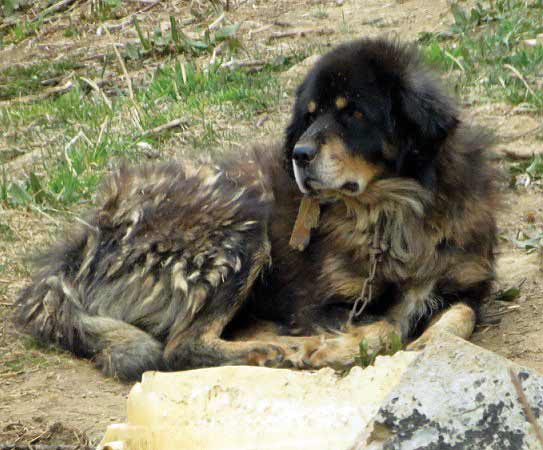Think pets and chances are that a dog will be the first thing on your mind. People have dogs for various reasons—for companionship, for security and for their children. However, not known to many is the fact that modern day dogs are a result of selective breeding. Human beings have selectively bred dogs over the fifteen thousand years of their association to form certain behaviors, characters::::, shapes and sizes. The result is that you have dogs like the Cocker Spaniel with long ears, short legs and a long body while larger Alsatians have Batman-like pointy ears. There are small dogs like the Poodles and huge giant-sized ones like the St. Bernard. Although genetically all dogs are descendents of wolves, man’s best friend is, in fact, the result of man-made breeding. Talking to four personalities here in Kathmandu, I got to know more about them and their pets. What follows are profiles of the owners and their best friends.
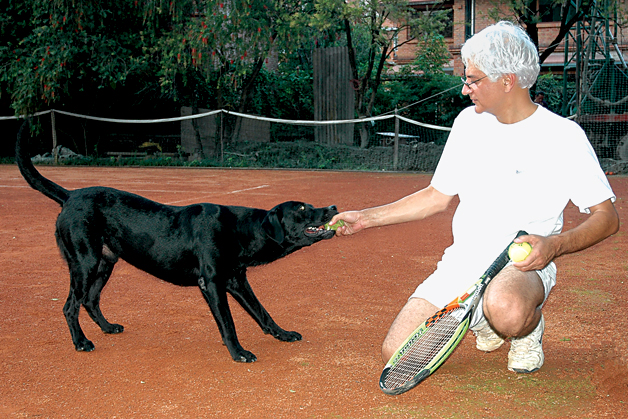
Kunda Dixit
Kunda Dixit, very well known in literary circles for his book “Dateline Earth” and for his nu-
merous “Under My Hat” columns in the Nepali Times, had once considered becoming a pilot. “But ink is in our blood,” he says with a smile, meaning his family and his ancestors, who are and were poets and writers and ultimately ended up where his heart lies. He has, under his belt, three volumes of “Under My Hat” compilations, ‘Dateline Earth’ (a journalism book) and ‘A peoples’ war’ (a pictorial of the decade long conflict in the country). He is currently working on another book.
His hobbies include trekking, playing tennis and practicing landings on the Microsoft flight simulator on his computer. He attended St. Xavier’s School in Godawari, St. Xavier’s College in Mumbai and Columbia University in New York where he studied journalism. Today, he is the co-publisher of Himalmedia and editor in chief of Nepali Times. A father of two sons, he owns a black Labrador who is very appropriately named “Haku”.
Kunda’s three-year old Labrador, Haku (or Hakucha as he is dotingly called) was one of six puppies— all black. Haku’s father was a black Labrador and his mother was a golden lab belonging to George Varughese who used to be with Asia Foundation in Kathmandu. The fact that Haku and his siblings are all black is indicative of the fact that they carry their father’s dominant gene and they all lean towards their father. Haku’s older brother is owned by Kunda’s younger brother Kanak Dixit.
Kunda talks about his dog and admits, Haku is “not heavy on the brain department”. But he is even tempered, friendly, gets jealous when Kunda shows affection to other dogs, hates crows and loves to play in water. Like his owner, Haku loves to hang out in the tennis court. Fetching every ball that Kunda smacks with his tennis racquet, Kunda calls Haku his “ball dog”. According to Kunda, he lets Haku get away with a lot more than anyone else in his household and he’s therefore Haku’s favorite person. “Exercise and an active lifestyle is a must for Labradors because they eat a lot and can get very fat if not controlled. This one,” Kunda says patting Haku, “gets a lot of exercise”.
Incidentally, it was Haku who inspired Kunda to write “Under My Hat” columns. Seeing my questioning look, Kunda explains that Haku is simple minded, but everyday Kunda learns so much from his dog. Whenever Kunda had a writer’s block while writing his weekly Under My Hat column, he looked at the world through Haku’s eyes and found just how absurd it all was. So, in a sense Haku is Kunda’s muse.
Earlier this year during Kunda’s live telephonic interview with Radio Australia, Haku started barking loudly towards the end of the interview. When it was over, the radio jockey in Sydney said, “Thank you Kunda Dixit. It was good to hear from you and also from your dog.” Haku is perhaps the only Nepali dog to have been on Radio Australia.
Pratima Pande
The daughter of Himalaya Shumshere Rana who was the chairman of Hima-layan Bank and the first governor of Nepal, Pratima Pande was exposed to various cultures at a very young age. She studied three years in New York, five years in Colombo in Sri Lanka, two years in St. Mary’s School here in Kathmandu and even went to an International American School in Kabul, Afghanistan. She then went on to Scotland to do her O and A Levels in Gordonstoun School where she studied with Prince Andrew, the Duke of York. She followed that with a three-year hotel and catering degree course in Huddersfield University in West Yorkshire, England.
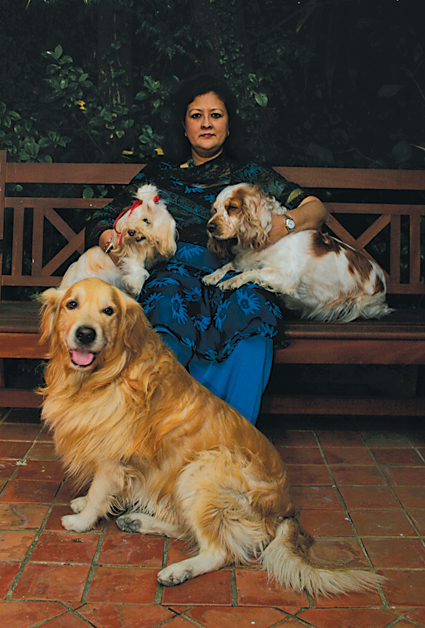 Back in 1972, she was the first Nepali girl to attend Gordonstoun school. Kurt Hahn, the famous educationalist who founded the school believed in an all rounded education. Hence, Pratima took part in social services and visited mentally handicapped kids, homes for the elderly and hospitals. This is where her interest in social service was born.
Back in 1972, she was the first Nepali girl to attend Gordonstoun school. Kurt Hahn, the famous educationalist who founded the school believed in an all rounded education. Hence, Pratima took part in social services and visited mentally handicapped kids, homes for the elderly and hospitals. This is where her interest in social service was born.
She is glad for all her experiences because it has made her better equipped to handle all that she manages today. Presently, this socialite (she prefers the term ‘social worker’) is the chairperson of Trek O’Tel hotel in Pokhara, the president of Nepal Britain Society, director of Infinity International
(a public relations and event management firm), director of Kathmandu Valley Preservation Trust, director of Alliance Francaise, executive member of Nepal Thailand Friendship Society and is one of the founder members of the Cultural Studies group of Nepal. Besides organizing dinner and cocktail parties, events, plays, art exhibitions, concerts and various functions, Pratima is also a patron of Nepali heritage and architecture. She has hosted numerous charity events. She helped raise fifty thousand rupees for the repair of Swoyambhunath, the Prattapur Temple, when it was damaged by fire a few years ago. At the time, HRH Prince Paras also matched the donation as he was also attending the musical program, “ICONS” organised by Infinity International. She recently attended a fund raising function hosted by Prince Charles, for the Kathmandu Valley Preservation Trust in London, where ninety thousand pounds was raised at the luncheon for restoration work to be done in Patan Darbar Square Palace Complex in the capacity of a director of the Trust.
Pratima has three dogs—a Golden Retriever named Tango who is 6 years old, a Lhasa Apso named Scooby who is 12 years old and a Cocker Spaniel named Leela who is two years old. Pratima’s favorite is Scooby the Lhasa Apso who even sleeps in the same room with Pratima. Scooby is gentle and a good watchdog who barks at the slightest noise. Tango the Golden Retriever is a big friendly dog that, quite surprisingly, started shivering out of nervousness when photographs were being taken for this feature. Scooby adores Pratima’s family especially her children (who are abroad studying at the moment). Scooby gets excited at the very mention of her son’s and daughter’s names and every year when they come home, Scooby is already eagerly waiting by the gate—barking and wagging his tail. Scooby’s prior knowledge of their arrival is a mystery. Pratima reckons that though they are animals, dogs are very intelligent and intuitive. They have an understanding of humans that is far greater than we give them credit for. Leela the Cocker Spaniel is a hunting dog. She is bright and sharp and walks awkwardly like an overweight seal!
Radhesh Pant
The MD/CEO of the Bank of Kathmandu, Radhesh Pant studied aeronautical engineering at the Indian Institute of Technology (IIT) in Mumbai and did his MBA from UCLA. His hobbies include swimming, Chinese martial art ‘taichi’ and reading books on philosophy and self help.
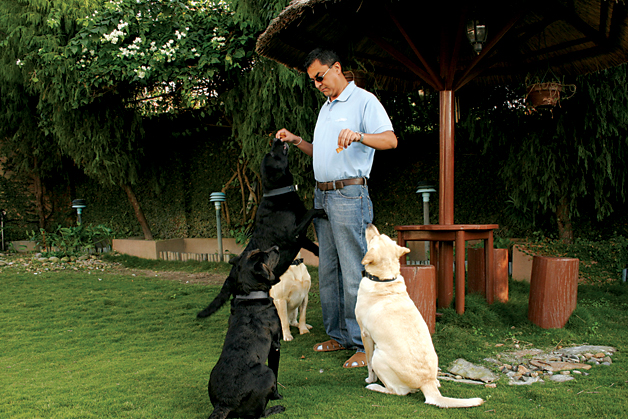
At 42, Radhesh has accomplished a lot. He is the President of Nepal Bankers Association, President of Nepal Scandinavia Chamber of Commerce & Industry, Vice President of the European Economic Chamber of Trade, Commerce & Industry, Kathmandu, Director of Hospital for Rehabilitation of Disabled Children (HRDC), Banepa, Founding Director of South Asian Institute of Management, Lalitpur, Executive Member of SAARC Chamber of Commerce & Industry, Kathmandu, Executive Member of Nepal Chamber of Commerce and the visiting faculty of Graduate School of Management, Kathmandu University, Lalitpur.
Before joining the Bank of Kathmandu, he worked for RNAC as an Operation/Planning Analyst for a year. From 1990 to 1992, he worked as a Financial Analyst for the Pacific Rim Interface Member Enterprises Inc. (PRIME) in San Diego, California. From 1992 to 1999, he worked for AMGEN Inc. in Thousand Oaks, California in various capacities. From 2000 to 2001, he worked for Necon Air as the advisor to the Chairman/Managing Director.
When I visited Radhesh’s residence in Bansbari one Saturday afternoon to check up on his canine friend, I was greeted by not one, but four Labradors barking upon my entrance. His wife, Anu Pant introduced me to the four dogs that were wagging their tails and running around us playfully. They are actually a family. Dave the black Labrador is the father, Devini, brownish-white, the mother and their offspring are Chankhe and Hero—black and brownish-white respectively.
Each one of them has his own unique personality. Dave the father is a friendly and an understanding dog. Being the oldest, he is not as active as the rest—hence, the fattest. Dave is very loyal and although he is a little stubborn, he is very obedient when a treat is in the offing. Devini is the hyperactive mother who never sits still. She is the one who is always playing or running around. Chankhe is the most obedient of them all. Hero is calm and a little whimsical. All of them, however, love sports—especially playing with tennis balls.
The Pant residence is also venue to “Dave’s Show”—a fun pet show for kids. The kids who come to the show take a natural liking to dogs. They clap and cheer every time the dogs perform a stunt. From time to time, kids from the orphanages are also invited for the show. Dave’s show is very rewarding for Radhesh and Anu because it gives them a chance to do something for the kids. It educates them and brings an awareness of caring for one’s pets. If you are interested, you can find out more about Dave’s show at this website: http://www.davespetworld.com. This is a non-profit endeavor on the part of the Pants. Their sole mission is to spread the message of kindness to animals. Anu is also spearheading a campaign to put water bowls in the streets for stray dogs. “Often times, these dogs are drinking filthy water from the drains,” Anu says, “I cannot do much for all the stray dogs but this is my way of making a little difference.” She hopes that little gestures like these will make people a little more aware of animal cruelty and how a little goes a long way. The Pants have a genuine love and compassion for dogs. They have landscaped their premises to make it dog friendly. They have four trainers for the dogs and have built a spacious cottage of natural wood for them. Even the tire cover on their SUV has a picture of the four loveable Labradors. The dogs are trained through rewards and are never punished. “Their level of enthusiasm and high spirits is amazing. They are loyal, happy and always seeking and giving affection like a child. We as people can learn a lot from dogs,” says Radhesh.
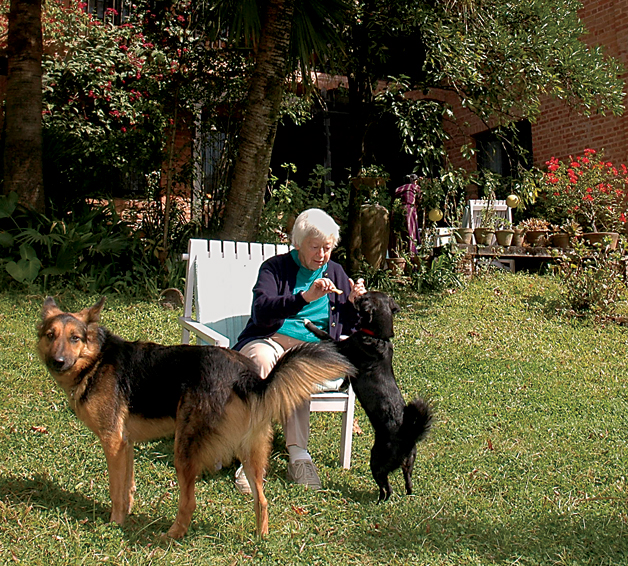
Olga Murray
Born in 1925, Olga Murray graduated from Columbia University and law school at George Washington University. She first visited Nepal in 1984. Back then, she was a lawyer and had come to Nepal for a trek. She immediately fell in love with this country and its people.
Today, Olga lives in Nepal for six to seven months a year. At an age when most people would have retired from work, this eighty one year old is the President and the country representative of the Nepalese Youth Opportunity Foundation (NYOF). This foundation has undertaken various projects in Nepal, the most notable of which is the rescue of bonded girls (as young as 6 year olds) in the Dang district who were contracted away by their parents to work far from home as servants. The foundation helped not by giving money to the parents of the bonded girls, but by giving them a piglet or a baby goat, which they could raise and then sell for about the same amount of money as they received for their daughters’ labor. The girls were then freed from the bonded labor contracts and put into schools at NYOF’s expense. Olga has even appeared in the Oprah Winfrey Show to spread awareness about the plight of these Dang girls and CNN recently broadcast a program about the problem.
In addition to this, the foundation has set up five hospitals around the country for malnourished children. While the child is restored back to health, the mother of the child is educated on childcare and nutrition. NYOF has also changed the lives of many economically and socially disadvantaged children all over Nepal. Another initiation of the foundation is the scholarships given to girls of the Dalit community. Olga says that taking care of children is very rewarding. “The kids,” she says, “are very resilient, and are just so happy when we do something for them. They just light up!” She has only two words to describe it– “instant gratification.”
Just like her unlikely change in career, Olga switched from not being a dog lover to being one. She said she surprised many people including herself, when she accepted a dog from her American expatriate friends in Nepal—Haydi & David Sowerwine, both close friends of Olga for more than 14 years. They left Nepal two years ago, leaving behind their dog Lucy with Olga. Lucy is of no breed in particular because she was picked up from the streets. Olga misses Haydi and David dearly and has a sentimental attachment to Lucy. Initially, Olga got Lucy as a watchdog because her guard was an old man who wasn’t much good at guarding. However, Lucy slept a lot during the nights and wasn’t much of a help either.
Olga then surprised everyone once again by getting a second dog—Singha, a German Shepherd. Singha, on the other hand, is an excellent watchdog. Olga says that Singha is capable of jumping over the gates of her residence—especially when he gets excited and is a friendly dog that loves to be petted. Olga is happy that Lucy and Singha get along very well. They are so happy living with Olga that unlike other dogs, they don’t even run out the gates when they are open. The dogs are well fed and visit the vet regularly. “They have added a lot to my life,” says Olga, “They’re lively, fun, always wagging their tails and don’t ask me a lot of questions.”


